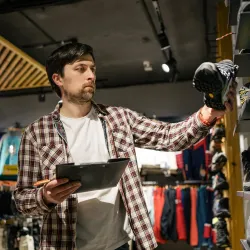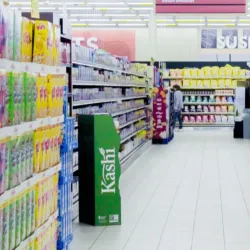Industry Knowledge
Eat Up: Food Delivery’s Growing Appetite for Mergers and Acquisitions
The State of the Food Delivery Industry
When it comes to food deliveries, timing is crucial. The same goes for the industry itself. While 2019 saw businesses and deals stalling, 2020 presented the food delivery space with a game-changing digital leap, with consumers ordering their way through meals. Today, as economies recover, consolidations are on the rise across the food delivery landscape.
According to Technavio’s latest market research, the global food delivery service is poised to reach $215.56 billion by 2024—a growth largely stimulated by growing Mergers and Acquisitions (M&A)1. Emerging brands and markets reveal new growth acquisition targets and are hungry to create footholds in new geographies. All these mean one thing: as more people continue to rely on on-demand services and opt for takeout and food deliveries, the opportunity is ripe for Mergers and Acquisitions to gain critical mass.
This said, let’s take a look at some of the most notable Mergers and Acquisitions that are shaping the food delivery industry today:
DoorDash and Caviar
In August 2019, leading food delivery platform DoorDash agreed to acquire delivery competitor Caviar for $410 million. Caviar, which offers a curated selection of restaurants that otherwise don’t offer delivery, marketed itself as a premium alternative to an already saturated market.
Launched in 2013 with 30 restaurants in San Francisco before expanding to other major cities like New York and Seattle, Caviar’s acquisition introduced DoorDash to a wider market.
This newly expanded customer base included not only customers wanting premium and fast-casual food, but also those who may jump between both segments. This move also spurred a unique monetization opportunity for DoorDash as new customers could be upsold with more premium options.
In this case, scaling operations are extremely critical in the food delivery industry as it creates a competitive advantage in a crowded market. DoorDash’s smart acquisition of Caviar also underlined the importance of creating a minimal overlap in existing operations and consumer bases. It augmenting offerings to create more opportunities2 3.
DoorDash and Chowbotics
DoorDash also acquired salad-making robot startup Chowbotics as part of the food delivery leader’s plan to help merchants grow and expand their offerings. Chowbotics was founded in 2014 when it launched its fresh food robot, Sally. The rectangular machine, which is essentially a salad vending machine, can create customizable salads, grain and poke bowls, parfaits, cereals, and snacks—all within a small space.
One helpful function that DoorDash is leveraging Chowbotics on is restaurant menu expansion. With Chowbotics, a pizzeria can start offering salads, for instance. The tech can also allow a salad bar to try out new locations, like a kiosk in an airport, without the need for additional manpower4 5.
Uber and Postmates
Uber acquired Postmates for approximately $2.65 billion which brought together Uber’s global Rides and Eats platforms with Postmates’s distinctive delivery business in the US.
An early pioneer of “delivery-as-a-service,” Postmates complements UberEats with differentiated geographic focus areas and customer demographics. Postmates’s strong relationships with small- and medium-sized restaurants, particularly local favorites, also draw customers to its brand. This pairs perfectly well with Uber’s growing efforts to expand its grocery and essential goods delivery.
This combination of platforms provides more choice and convenience for consumers, increased demand, tailored technology offerings for restaurants, and opened new income opportunities for delivery professionals6.
Uber and Drizly
Uber also acquired Drizly for approximately $1.1 billion, making the alcohol delivery platform a wholly owned subsidiary. Drizly’s marketplace will then be integrated with the UberEats app, while also maintaining a separate Drizly app.
Drizly leads the on-demand alcohol marketplace, available and designed to be fully compliant with local regulations in more than 1,400 cities across the majority of the US.
Drizly plans to innovate and expand independently in its fast-growing and competitive sector. It also aims to gain access to the advanced mobile marketplace technologies of the world’s largest food delivery and ridesharing platform. Merchants on Drizly will benefit from Uber’s advanced technology and significant consumer base.
Further, delivery drivers will also have more ways to earn because of this consolidation. Uber’s rewards and subscription programs can bring even greater value to consumers with new benefits and perks from Drizly7.
Meanwhile, Grab and Altimeter Growth are on a blank-check merger—the biggest one yet.
Grab, the largest ride-hailing and food delivery firm in Southeast Asia, clinched a merger on April 13 with special-purpose acquisition company Altimeter Growth. The technology-focused investment firm based in Silicon Valley has over $10 billion in assets and is securing a valuation of nearly $40 billion, paving the way for a coveted US listing. This deal underscores the frenzy on Wall Street as shell firms have raised $99 billion in the US so far this year after a record of $83 billion in 2020.
Grab and Altimeter Growth will become fully owned subsidiaries of a new holding company, which is expected to be valued at $39.6 billion. The transactions will give Grab about $4.5 billion in cash proceeds, which will be used to double down on its last-mile delivery network and bulk up its financial services business.
With operations in eight countries and over 400 cities, this ride-hailing business has expanded to food and grocery deliveries, courier services, and digital payments, and is now making a push into insurance and lending.
The listing will give Grab extra firepower in its main market of Indonesia, where local rival Gojek is close to sealing a merger with the country’s leading e-commerce business, Tokopedia8.
Making That Significant Move with Us
When companies merge and acquire, a profound effect on their growth prospects and long-term outlook can be seen. Merging or acquiring is a corporate strategy to expand one’s business or fend off a competitor. However, there are potential risks associated with combining two businesses: “operating a company with a presence in multiple markets, a more extensive and diverse customer base, a more complex product and services portfolio, and a high level of people and operational complexity.”
At TaskUs, we’ve partnered with big business players and industry disruptors alike. We’ve been part of movements and consolidations, helping enterprises transition and take the next step as we continue to support their growth and transformation.
With TaskUs’s outstanding digital customer solutions, we can provide support to our food delivery clients across wider demographics in several geographies. Often, such consolidations require seamless experience, as new products and services are brought to the table.
We at TaksUs have deep expertise in supporting these growths and transformations, providing consistent quality and high performance along with process improvements. As our clients expand their offerings, we work with them hand-in-hand to ensure satisfaction not just for their customers, but for their drivers, riders, and partner merchants too. Supporting this many stakeholders is not an easy feat, because each stakeholder has different needs, and so the support given to them has to be tailored as well. Our track-record of supporting hyper-growth companies enabled us to develop techniques and strategies to create tailor fit solutions. We do this by taking a collaborative approach, and making sure that we put our uncompromising people-first philosophy front and center.
Alongside these, our drive for trust and safety help our clients leverage contactless technology solutions, among other innovations. We help clients embrace digital transformation as we invest in innovation and digitization to increase efficiencies, and transform the way enterprises do business and interact with their customers—all while ensuring that privacy and security also remain our utmost priority.
For companies considering consolidations or are undertaking mergers and acquisitions, success doesn’t just entail closing the deal. In fact, these movements have far-reaching consequences that often shape the industry itself—it is critical to have a reliable, agile, and refreshing outsourcing provider to partner with along the way.
Learn more about how TaskUs adds value to support the food delivery industry and how we leverage AI and machine learning to bring ridiculously good outsourcing for our clients.
References

We exist to empower people to deliver Ridiculously Good innovation to the world’s best companies.
Services







